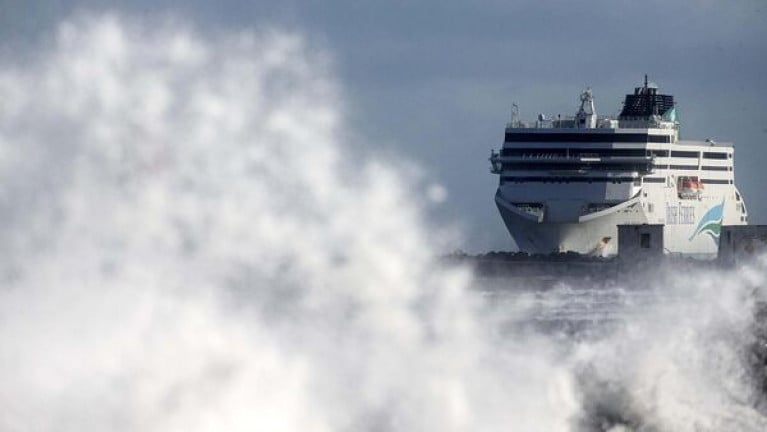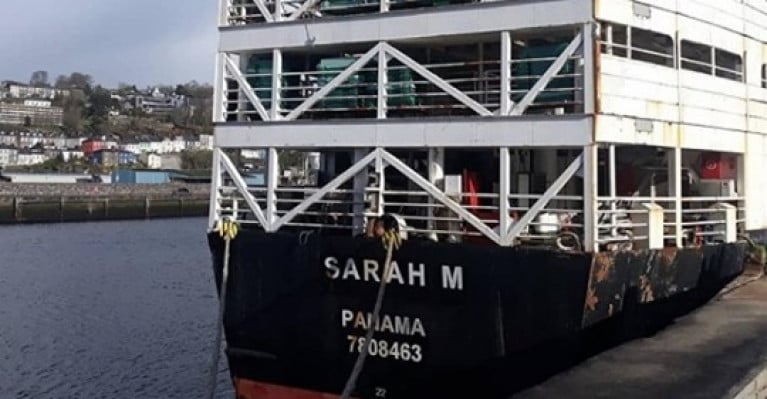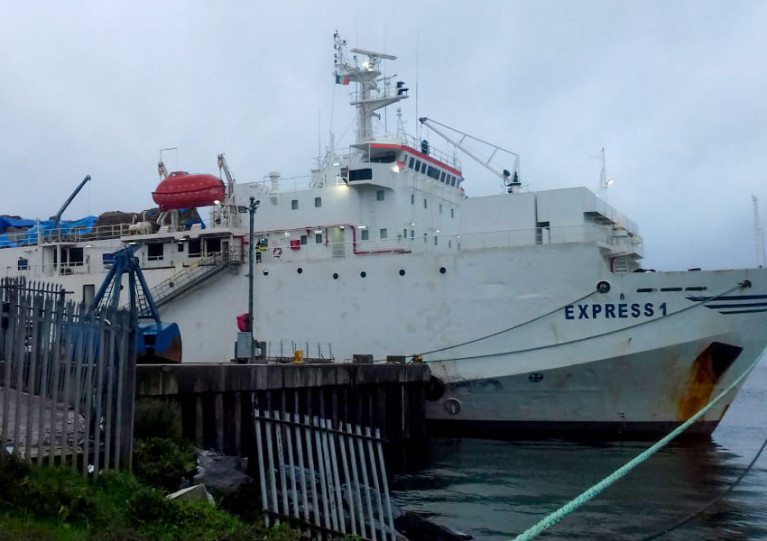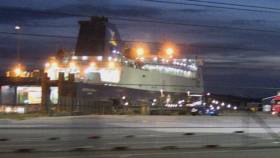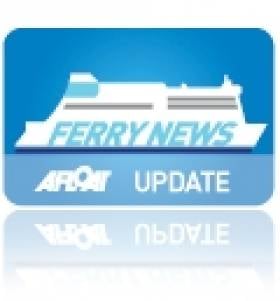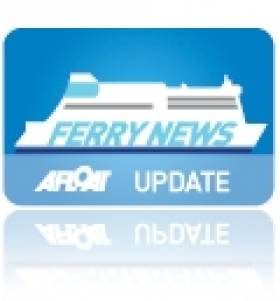Displaying items by tag: Livestock
Ferry Companies Cancel Calf Shipments to France this Week
Two ferry companies sailing from Ireland to Cherbourg, France, have confirmed they will not bring livestock lorries on sailings scheduled for this week.
Both Irish Ferries and Stena Line have confirmed to Agriland.ie that they will not carry livestock for health and safety reasons due to Storm Dudley and Storm Eunice.
One ferry company representative said that the Cherbourg sailing (Thurs, 17 Feb) has been cancelled, adding that the weekend sailing “definitely wont be taking livestock” and may be “cancelled altogether” due to the storms.
These developments will put further pressure on traders selling calves to mainland Europe as it delays the supply of calves by a week.
More here on this story.
Livestock-ship ‘Sarah M’, which remains anchored and empty in the Waterford Estuary off Dunmore East, now appears set to ship cattle to Algeria by the end of this week.
A statement issued this morning by Emerald Isle Beef Producers (EIBF) declared that “the recent technical difficulties regarding the shipment of cattle to Algeria have now been ironed out”.
Stating that the Sarah M is “now scheduled to head to Algeria before the end of the week,” EIBF referred to a “stalemate” between the Department of Agriculture “and the shipping company as regards procedures to be followed for the shipment”.
As the Waterford News & Star previously reported, exporters Roundwood Park Livestock and Premium Livestock postponed the shipment of bulls and bullocks (from Belview-The Port of Waterford) last Friday as it didn’t have a “sufficient quantity of compliant animals for export assembled by then”.
A complication arose due to a difficulty with cattle not being administered a wormer at their farm of origin prior to their scheduled transport, which would have ensured that the required withdrawal period would have been fulfilled prior to slaughter in Algeria.
That this didn’t happen, in what would have been the vessel’s second recent sailing to north Africa, has led to the Sarah M’s sitting empty and moored in the Estuary in the interim.
More on the cattle-ship story reports the Waterford newspaper here.
Livestock Export Ships Have Licences Revoked Over Operator’s Low Performance Rating
Two ships that regularly carry livestock from Ireland to the Middle East and North Africa have had their licences revoked over their operator’s low performance rating.
According to The Guardian, it emerged that the Department of Agriculture, Food and the Marine (DAFM) was unaware that the operator of the Atlantic M and the Express 1 had a rating below required standards until it was alerted by welfare organisation Ethical Farming Ireland.
Emiroglu Deniz Nakliyati, the Turkish operator of the two vessels, was rated as “low or very low” in the European Maritime Safety Agency’s performance tables of Port State Control.
The situation has now prompted questions over monitoring of the livestock export fleet. Bord Bia figures show agri-food exports account for a tenth of Ireland’s total exports.
The Guardian has much more on the story HERE.
P&O Stops Transporting Calves Following BBC Investigation
#FerryNews - A North Channel ferry operator has said that it will stop carrying calves to Europe after animal welfare concerns were raised by a BBC Scotland investigation.
According to BBC News Scotland, P&O said it was ending the practice with immediate effect following the broadcast on Monday of "Disclosure: The Dark Side of Dairy".
The Scottish government said it was concerned at P&O's reaction.
NFU Scotland said it was a "disappointing" decision and described the documentary as "sensationalised".
About 5,000 calves were shipped to Europe last year from Scotland.
Campaigners claim the long journey is harmful but the industry said the alternative was shooting them at birth.
Male calves are surplus to requirements on dairy farms.
Disclosure: The Dark Side of Dairy was broadcast on BBC One Scotland on 10 September and is available on the BBC iplayer
The Disclosure team learned that calves were being exported via the port of Cairnryan in Dumfries and Galloway.
For much more on the story, click here including a link to the television investigation.
Role of Rosslare Ferries Drive Up Livestock Exports to UK by 65%
#Livestockferry – Over 16,500 animals have been exported to Britain in 2014, an increase of nearly 65% compared to last year according to the Irish Minister for Agriculture Simon Coveney.
The Minister said that in recent years Irish exporters wishing to export livestock to Britain were able to avail of roll-on, roll-off ferry services from Belfast or Larne.
However, he said early in 2014 an application was received from a shipping company for approval of a roll-on, roll-off ferry to carry livestock from Rosslare and following an inspection this ferry was approved for carriage of livestock.
The first such consignment to the UK took place in February 2014, and regular consignments of livestock have been carried from Rosslare since then, the Minister said.
For further coverage, AgriLand has a report here.
#MCIB - The families of two fishermen found dead at sea off the Skerries last April may never uncover the circumstances that led to their demise. But the official report into the incident indicated that the absence of lifejackets was a significant contributing factor.
Ronan Browne (26) and David Gilsenan (41) were reported missing on the evening of 1 April after failing to return from a trip tending to lobster pots.
Their vessel, Lady Linda, was found the following morning upturned in an oil slick off Clogherhead with no sign of the crew.
It wasn't until a week later that their bodies were discovered caught in the vessel's fishing gear some five miles east of Clogherhead, as previously reported on Afloat.ie.
Post-mortem results found that both men died from drowning, with Gilsenan also showing signs of hypothermia.
With no eyewitnesses to the incident, the report by the Marine Casualty Investigation Board (MCIB) indicated a number of possible causes from eqiupment malfunction or shifting of lobster pots on deck, to the wave height and weather conditions on the day, which were reportedly deteriorating when the boat left port.
It also said that Browne and Gilsenan "were lifelong friends, both men were experienced and qualified marine engineers in the fishing vessel industry. Both men were experienced in boat handling and fishing and had worked together on many occasions."
But the report emphasised the lack of personal flotation devices (PFDs) on board, and noted that emergency equipment was stored under the deck and not easily accessible.
The MCIB's recommendations include a review of the code of practice for fishing vessels under 15m to establish "revised stability critera" and ensuring that all boats are fitted with automatic radio beacons that deploy upon capsize.
In a separate incident, lack of proper maintenance led to an unlicenced boat taking on water off Co Kerry last August.
The Claire Buoyant was carrying one crew, five passengers and 21 sheep from Beginish Island to Ventry when the vessel began to lose stability.
Skipper Eoin Firtear - who the MCIB described as having "limited sea-going experience" - and his five passengers were rescued by passenger ferry. All sheep were jettisoned overboard, with 18 eventually recovered.
The report reminded that the carriage of livestock should only be undertaken in appropriately certified vessels.
- MCIB
- Marine Casualty Investigation Board
- report
- Lady Linda
- Clogherhead
- Ronan Browne
- David Gilsenan
- lobster pots
- Fishing
- drowning
- hypothermia
- missing
- malfunction
- wave height
- Weather
- lifejackets
- Personal Flotation Devices
- PFDs
- Code of Practice
- stability
- Radio
- beacon
- maintenance
- unlicenced
- Co Kerry
- Claire Buoyant
- Sheep
- Passengers
- Beginish Island
- Ventry
- Eoin Firtear
- Skipper
- Rescue
- Livestock
Celtic Link Ferries First Ferry Goes to the Breakers
Launched as the Stena Tranporter, the career of the 16,000 tonnes has spanned over three decades in which the 151m vessel changed through several owners and subsequent vessel renamings.
It was when she served under the name Baltic Ferry, that her most notable career took place in 1982 during her wartime deployment as part of the
Falklands Islands Task Force. The 151m vessel was requisitioned by the British Ministry of Defence which saw the ship engaged in military operations when RAF Harrier Jump-Jet aircraft transferred store supplies from the deck of the ship as part of the war-effort in the South Atlantic Ocean.
In 2001 the vessel undertook ferry operations to Ireland as the European Diplomat on the Dublin-Liverpool route for the P&O (Irish Sea) route network. The following year she was transferred on the direct route to France until P&O pulled the plug on the continental service in December 2004, leaving Irish Ferries as the sole operator.
It was not until February 2005 that the route resumed service but this time under new owners Celtic Link Ferries. The O'Flaherty brothers, owners of a large fishing fleet in Kilmore Quay purchased the vessel and renamed her Diplomat. See PHOTO.
For the next four years she built up a steady customer loyalty between freight-hauliers drivers and car-only accompanying passengers who were accommodated in the ship which had a limited passenger certificate for 114 passengers. In addition she had a license to transport livestock.
Currently Celtic Link Ferries operate the ferry Norman Voyager but the 800-passenger / 200-car ro-pax vessel will only remain on the route until an October debut of a larger sistership the Cartour Beta.
The vessel is running this season between Italy and Sicily and with an added deck the 27,552 tonnes vessel has an increased capacity for passengers, cars and enhanced range of facilities. Recently the company had run a competition to name the new vessel which is to begin a five-year charter on the service between Wexford and Normandy.
- Wexford
- irish sea
- Diplomat
- Celtic Link Ferries
- Kilmore Quay
- Stena Rederi
- Marine Express
- RosslareCherbourg
- Norman Voyager
- Ports and Shipping News
- Normandy
- RoPax
- DublinLiverpool
- P&O (Irish Sea)
- Ferry news
- Cartour Beta
- Irish Sea Ferries
- Stena Transporter
- Baltic Ferry
- European Diplomat
- O'Flaherty Brothers
- Falklands Islands Task Force
- Hyundai Heavy Industries
- Freighthauliers
- Livestock
- RAF
- Harrier JumpJets


























